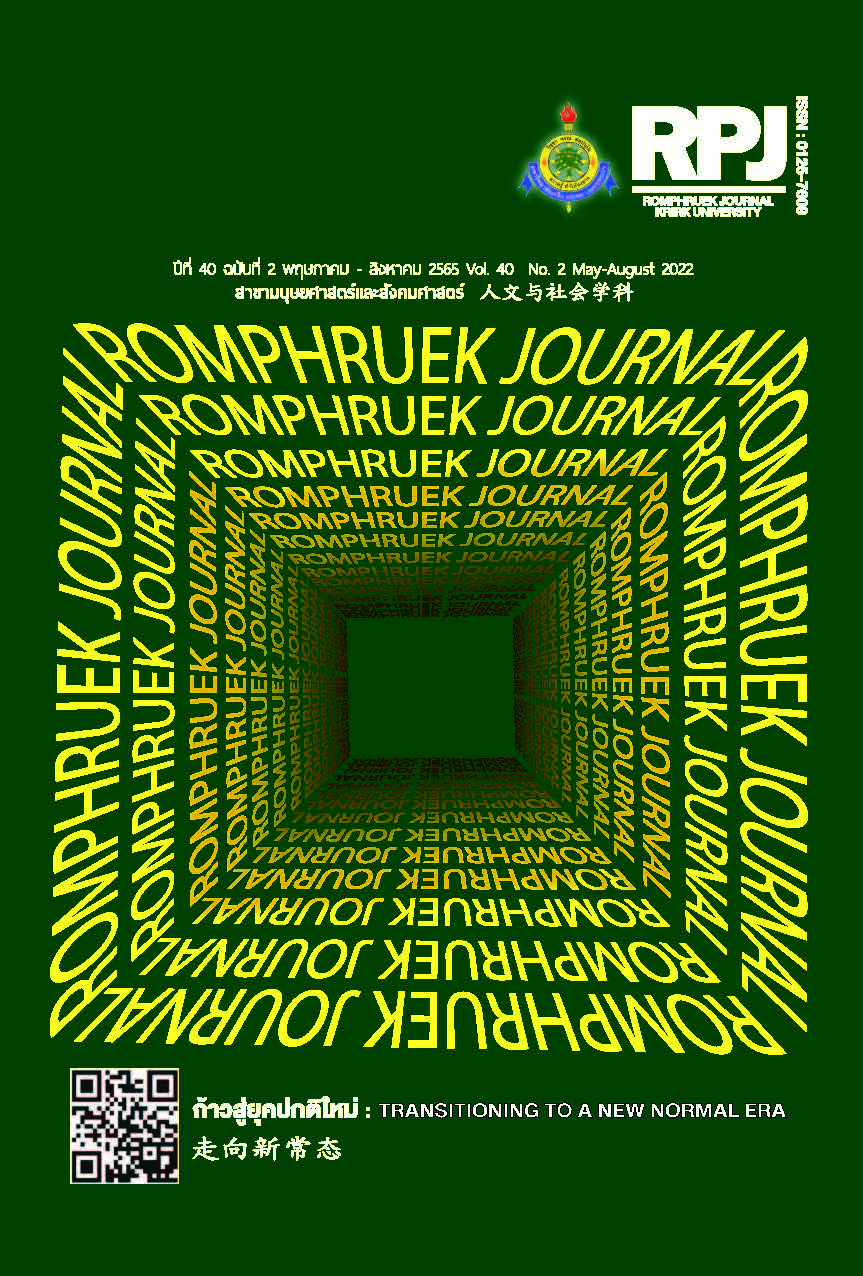Online Teaching Components (E-learning) Influencing the Learning Outcomes of Thai Qualification Framework for Higher Education in Digital Era
Main Article Content
Abstract
The objectives of this research were: 1) to study the opinions about the components of online teaching (e-learning) for students. 2) to study the opinions about online teaching (e-learning) in accordance with learning outcomes of Thai qualification framework for higher education for teachers and students. 3) to study the components of online teaching (e-learning) for students influencing the learning outcomes of Thai qualification framework for higher education. Regarding the research methodology, both quantitative and qualitative research was applied. The sample was 400 undergraduate students and 12 lecturers. The tools of this research were a questionnaire and in-depth interview. The statistics used were frequency, percentage, means, standard deviation and multiple regression analysis coefficient with statistically significant level of 0.05. The results showed that 1) the opinion about the component of online teaching (e-learning) 1st rank was the communication system and learning interaction. 2) the opinion about online teaching (e-learning) in accordance with learning outcomes of Thai qualification framework for higher education 1st rank was interpersonal skills and responsibility. 3) components include content/learning materials, information system/communication, communication system/educational interactions and teacher/learner were able to predict 62.7 percent of their influence on the learning outcomes of Thai qualification framework for higher education and the equation of standard score was Y=0.214 (X1)+0.243 (X2)+0.125(X3)+0.137(X6)
Article Details

This work is licensed under a Creative Commons Attribution-NonCommercial-NoDerivatives 4.0 International License.
Every article published in the Romphruek Journal of the Humanities and Social Sciences is the opinion and point of view of the authors. Thery're not the viewpoint of Krirk University or the editored department. Any part or all of the articles for pablication must be clearly cited.
References
เกียรติกำจร กุศล กำไล สมรักษ์ จันทร์จุรี ถือทอง และ ธัญวลัย หองส่ำ. (2560). ผลการจัดการเรียนรู้โดยใช้ปัญหาเป็นฐานต่อการเสริมสร้างผลการเรียนรู้ตามกรอบมาตรฐานคุณวุฒิระดับอุดมศึกษาแห่งชาติของนักศึกษาพยาบาล ในรายวิชาภาวะผู้นำ และการจัดการทางการพยาบาล. วารสารการพยาบาลและการศึกษา, 10(3), 1-8.
ชินวัฒน์ ไข่เกตุ ณัชชาจารย์ โรจน์วัฒนดิษกุลม ประกรณ์ ตุ้ยศรีม ภัทร ยันตรกร และ ธัชกร พุกกะมาน. (2564). ผลการเรียนรู้ตามกรอบมาตรฐานคุณวุฒิระดับอุดมศึกษาแห่งชาติของนักศึกษาหลักสูตรศึกษาศาสตรบัณฑิต สาขาวิชาพลศึกษา มหาวิทยาลัยเชียงใหม่, วารสารมนุษยศาสตร์และสังคมศาสตร์ มหาวิทยาลัยพะเยา, 9(1), 56-79.
ฐาปนีย์ ธรรมเมธา. (2557). อีเลิร์นนิง : จากทฤษฎีสู่การปฏิบัติ e-Learning : from theory to practice โครงการมหาวิทยาลัยไซเบอร์ไทย. กรุงเทพฯ : สำนักคณะกรรมการการอุดมศึกษา.
ปัทมาภรณ์ คงขุนทด ฉัตรทอง จารุพิสิฐไพบูลย์ นุชมาศ แก้วกุลฑล นฤมล เปรมาสวัสดิ์ และ มยุรี พางาม. (2563). ความคิดเห็นของผู้ใช้บัณฑิตต่อคุณภาพบัณฑิต และอัตลักษณ์ของพยาบาลจบใหม่ที่สำเร็จการศึกษาจากวิทยาลัยพยาบาลบรมราชชนนี นครราชสีมา ปีการศึกษา 2561, วารสารวิชาการสาธารณสุข, 29(6), 1086-1094.
พชร ลิ่มรัตนมงคล และ จิรัช วิเชียรปัญญา. (2556). ปัจจัยแห่งความสำเร็จของการเรียนออนไลน์ของผู้เรียนโครงการมหาวิทยาลัยไซเบอร์ไทย, วารสารรังสิตสารสนเทศ, 19(2), 54-63.
วิทยา วาโย อภิรดี เจริญนุกูล ฉัตรสุดา กานกายันต์ และ จรรยา คนใหญ่. (2563). การเรียนการสอนแบบออนไลน์ภายใต้สถานการณ์แพร่ระบาดของไวรัส COVID-19 : แนวคิดและการประยุกต์ใช้จัดการเรียนการสอน. วารสารศูนย์อนามัยที่ 9, 14(34), 285-297.
สถิติอุดมศึกษา. (2561). สถิติอุดมศึกษา ปีการศึกษา 2561. (20 มกราคม 2564) สืบค้นจาก http://www.mua.go.th/assets/img/pdf/stat.pdf.
สำนักงานคณะกรรมการอุดมศึกษาแห่งชาติ. (2552). กรอบมาตรฐานระดับอุดมศึกษา. (2 ตุลาคม 2563) สืบค้นจาก http://www.mua.go.th/users/tqf-hed/.
Eze, S.C., Chinedu-Eze, C.A., Okike, C.K. & Bello, A.O. (2020). Factors influencing the use of e-learning facilities by students in a private higher education institution (HEI) in developing economy. Humanities and Social Sciences Communications, 7(133), 1-15.
Gopal, R., Singh, V. & Aggarwal, A. (2021). Impact of online classes on the satisfaction and performance of students during the pandemic period of COVID19. Education and Information Technologies, 26(5), 1-25.
Panda, D., Gamal, M., Zafar, A., Parambi, D., Senapati, A., Patro, S., Sahoo, P., & Bose, A. (2020). A study on the effectiveness of online teaching in pharmacy education from teacher and student perspective during the covid-19 pandemic. Pharmacy Education, 20(2), 297-301.
Pham, L., Limbu, Y., Bui, T., Nguyen, H., & Pham, H. (2019). Does e-learning service quality influence e-learning student satisfaction and loyalty? Evidence from Vietnam. International Journal of Education Technology in Higher Education, 16(7),1-26.
Yamane, T. (1973). Statistics : An Introductory Analysis. (3rd ed.), New York : Harper & Row.


